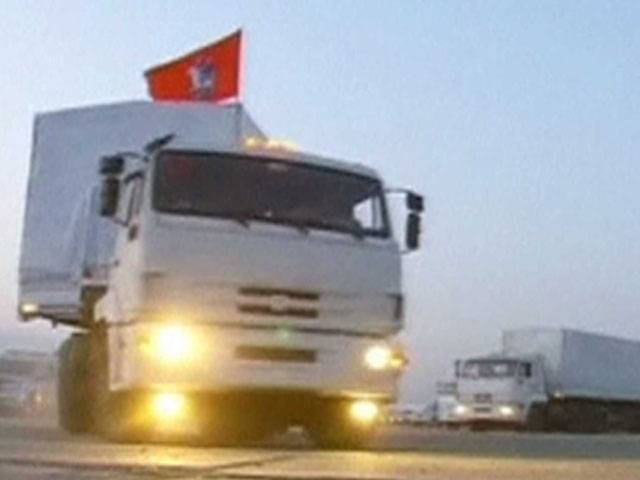KIEV - A massive Russian aid convoy rumbled towards Ukraine's border on Wednesday as Kiev vowed to block what it feared could be a "Trojan horse" bringing military assistance to pro-Kremlin rebels fighting a bloody insurgency in the east.
Russian television images showed a line of nearly 300 lorries moving through the countryside, covered with white tarpaulin and stretching over almost three kilometres (two miles).
The mission has sparked fears the four-month conflict, which has already left over 1,500 dead and plunged relations between Moscow and the West to a post-Cold War nadir, could be about to escalate even further. Western powers say Russia might use the operation as a "Trojan horse" to sneak in troops or weapons for pro-Moscow insurgents, who have been losing ground against government troops in eastern Ukraine.
Ukraine's interior minister Arsen Avakov lashed out at Moscow's move as a "provocation by the cynical aggressor" and reiterated Kiev's insistence that "no humanitarian convoy of (Russian President Vladimir) Putin's will be allowed to cross the territory."
Earlier, it said the trucks would be stopped at the border, and the aid unloaded and transported into conflict-torn eastern Ukraine with the help of the International Committee of the Red Cross (ICRC).
Russia insists it has coordinated the mission with the ICRC and that the convoy does not include military personnel.
But the ICRC has denied it is involved and told AFP they had not been able to check what was inside the convoy.
A journalist from Russian tabloid Komsomolskaya Pravda travelling with the convoy wrote on Twitter on Wednesday morning that the lorries had halted as they waited for "political decisions" to be taken.
Other Russian journalists with the convoy said it was due to arrive at the border by evening.
There were concerns in Kiev that the vehicles, officially bound for a government-controlled border checkpoint, could take a different route to the east across a rebel-held stretch of the border.
The convoy - with between 262 and 287 vehicles, according to Russia's foreign ministry - left the Moscow region on Tuesday carrying over 1,800 tonnes of "humanitarian supplies", including medical equipment, baby food, sleeping bags, and electric generators, Russian media reported.
Four months of fierce battles between Ukrainian forces and insurgents have left rebel strongholds in the east without power, running water or fuel, and with dwindling food supplies.
ICRC's spokesman in Kiev, Andre Loersch, told AFP on Wednesday that "discussions are still ongoing" with Russia.
"The ICRC needs more details of what is in the convoy. The convoy is on the road and the ICRC has not had the opportunity to check what is inside," he added.
Ukrainian Prime Minister Arseniy Yatsenyuk meanwhile lashed out at Moscow for fuelling the pro-Kremlin insurgency tearing apart the country.
"Russian cynicism knows no bounds," he told a cabinet meeting. "First they delivered tanks, Grad missiles, terrorists and bandits to shoot Ukrainians and now they are delivering water and salt."
"It would be better for the Russians to send 300 empty lorries to take back their bandits. Then there wouldn't be any need to send humanitarian aid."
Moscow denies it is seeking to boost the insurgents, but NATO says it has massed 20,000 troops along the border to its former Soviet neighbour.
The United States on Tuesday again warned Russia against any unilateral action in Ukraine, while France expressed fears that Moscow could use the operation as "a cover" for sending in troops, leaving the West with a "fait accompli."
As fighting continued to recapture rebel-held cities, Ukraine's military said on Wednesday that 11 servicemen had been killed and 41 injured in the last 24 hours.
Separately, the ultranationalist group Pravy Sektor (Right Sector), which has been fighting with government forces, said that 12 of its members had been killed in an ambush in the main rebel stronghold of Donetsk.
Five civilians were also injured as mortar fire continued to pound the city, already surrounded by the army, local authorities said.
Some 285,000 poeople have fled their homes in four months of what the Red Cross has officially deemed a civil war.
Friday, April 19, 2024
Ukraine says will not let Russian convoy onto its territory

Caption: Ukraine says will not let Russian convoy onto its territory
9:58 PM | April 18, 2024
Sports Minister opens gymnasium hall, multi-purpose stadium
April 19, 2024
3.5-magnitude earthquake hits Quetta
1:10 AM | April 19, 2024
Hepatitis Challenge
April 18, 2024
IMF Predictions
April 18, 2024
Wheat War
April 18, 2024
Rail Revival
April 17, 2024
Addressing Climate Change
April 17, 2024
Justice denied
April 18, 2024
AI dilemmas unveiled
April 18, 2024
Tax tangle
April 18, 2024
Workforce inequality
April 17, 2024
New partnerships
April 17, 2024
ePaper - Nawaiwaqt
Advertisement
Nawaiwaqt Group | Copyright © 2024





